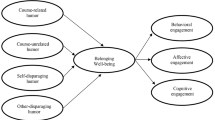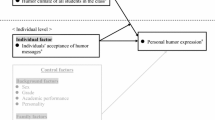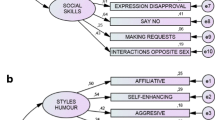Abstract
A sense of humor constitutes a core factor that influences teacher-student interactions. The humor that teachers utilize in class may influence teacher-student relationships, either positively or negatively. Moreover, teachers’ humor style influences students’ humor style, and vice versa. This study aimed to construct patterns of humor styles based on typology and explore how these patterns influence their interactions. Data were collected from 990 Taiwanese students regarding their self-reported humor styles and perceptions of class teachers as well as the interaction between the two. Subsequently, k-means clustering was conducted by dividing participants into four clusters based on the collected data: positive humor endorsers, negative humor endorsers, humor deniers, and contradictory humor endorsers. Among these, the grouping of contradictory humor endorsers differed from previous findings. Among the four clusters, the teachers of positive humor endorsers were perceived to have a significantly higher influence and proximity to students, whereas contradictory humor endorsers were perceived to have the lowest influence and proximity to students. The research findings revealed that different patterns of teachers’ and students’ humor styles have a distinct influence on their interactions, which deepens our understanding of the extent to which their humor styles consistently impact their interactions.
Similar content being viewed by others
References
Anlı, G. (2021). Reliability and validity studies of the Turkish version of humor styles questionnaire for children. Current Psychology, 40(9), 4416–4426
Aşılıoğlu, B. (2021). A Study on Humor Styles of Teacher Candidates. International Education Studies, 14(3), 138–146
Ayuwanti, I., Marsigit, & Siswoyo, D. (2021). Teacher-student interaction in mathematics learning. International Journal of Evaluation and Research in Education, 10(2), 660–667
Cann, A., Calhoun, L. G., & Banks, J. S. (1997). On the role of humor appreciation in interpersonal attraction: It’s no joking matter. Humor: International Journal of Humor Research, 10, 77–89
Chan, Y. C., Chen, H. C., Cho, S. L., & Martin, R. A. (2011). Development of a traditional Chinese version of the humor styles questionnaire. Psychological Testing, Special issue, 207–234
Chang, J. H., Chen, H. C., Hsu, C. C., Chan., Y. C., & Chang, Y. L. (2015). Flexible humor styles and the creative mind: Using a typological approach to investigate the relationship between humor styles and creativity. Psychology of Aesthetics Creativity and the Arts, 9(3), 306–312
Chiang, Y. C., Lee, C. Y., & Wang, H. H. (2016). Effects of Classroom Humor Climate and Acceptance of Humor Messages on Adolescents’ Expressions of Humor. Child & Youth Care Forum, 45, 543–569
Clem, A. L., Rudasill, K. M., Hirvonen, R., Aunola, K., & Kiuru, N. (2021). The roles of teacher–student relationship quality and self-concept of ability in adolescents’ achievement emotions: Temperament as a moderator. European Journal of Psychology of Education, 36, 263–286
Durksen, T. L., Way, J., Bobis, J., Anderson, J., Skilling, K., & Martin, A. J. (2017). Motivation and engagement in mathematics: a qualitative framework for teacher-student interactions. Mathematics Education Research Journal, 29, 163–181
Galloway, G. (2010). Individual differences in personal humor styles: Identification of prominent patterns and their associates. Personality and Individual Differences, 48, 563–567
Ghasemi, F. (2021). Exploring middle school teachers’ perceptions of factors affecting the teacher–student relationships. Educational Research for Policy and Practice
Gorham, J., & Christophel, D. M. (1990). The relationship of teachers’ uses of humor in the classroom to immediacy and student learning. Communication Education, 39(1), 46–62
Heintz, S., Ruch, W., Aykan, S., Brdar, I., Brzozowska, D., Carretero-Dios, H., Chen, H.-C., Chłopicki, W., Choi, I., Dionigi, A., Ďurka, R., Ford, T. E., Güsewell, A., Isler, R. B., Ivanova, A., Laineste, L., Lajčiaková, P., Lau, C., Lee, M., ... Wong, P. S. O. (2020). Benevolent and Corrective Humor, Life Satisfaction, and Broad Humor Dimensions: Extending the Nomological Network of the BenCor Across 25 Countries. Journal of Happiness Studies, 21(7), 2473–2492
Kane, T. R., Suls, J., & Tedesch, J. T. (1977). Humor as a tool of social interaction. In A. J. Chapman & H. C. Foot (Eds.), It’s a funny thing, humor. Pergamon
Kaplan, R. M., & Pascoe, G. C. (1977). Humorous lectures and humorous examples: Some effects upon comprehension and retention. Journal of Educational Psychology, 69(1), 61–65
Kline, R. B. (1998). Principles and practice of structural equation modeling. Guilford Press
Kuiper, N. A., Grimshaw, M., Leite, C., & Kirsh, G. (2004). Humor is not always the best medicine: Specific components of sense of humor and psychological well-being. Humor: International Journal of Humor Research, 17(1–2), 135–168
Leary, T. (1957). Interpersonal diagnosis of personality: a functional theory and methodology for personality evaluation. Ronald Press
Lei, S., Cohen, J. L., & Russler, K. (2010). Humor on Learning in the College Classroom: Evaluating Benefits and Drawbacks from Instructors’ Perspectives. Journal of Instructional Psychology, 37, 326–332
Machlev, M., & Karlin, N. J. (2017). The Relationship Between Instructor Use of Different Types of Humor and Student Interest in Course Material. College Teaching, 65(4), 192–200
Martin, R. A. (2001). Humor, laughter, and physical health: methodological issues and research findings. Psychological bulletin, 127(4), 504–519
Martin, R. A. (2007). The psychology of humor: An integrative approach. Academic Press
Martin, R. A., Puhlik-Doris, P., Larswn, G., Gray, J., & Weir, K. (2003). Individual differences in uses of humor and their relation to psychological well-being: Development of the Humor Styles Questionnaire. Journal of Research in Personality, 37, 48–75
Pennings, H. J. M., & Hollenstein, T. (2020). Teacher-Student Interactions and Teacher Interpersonal Styles: A State Space Grid Analysis. Journal of Experimental Education, 88(3), 382–406
Pöysä, S., Vasalampi, K., Muotka, J., Lerkkanen, M. K., Poikkeus, A. M., & Nurmi, J. E. (2019). Teacher-student interaction and lower secondary school students’ situational engagement. The British journal of educational psychology, 89(2), 374–392
Praag, L. V., Stevens, P. A. J., & Houtte, M. V. (2017). How humor makes or breaks student-teacher relationships: A classroom ethnography in Belgium. Teaching and Teacher Education, 66, 393–401
Roorda, D. L., Jorgensen, T. D., & Koomen, H. M. Y. (2019). Different teachers, different relationships? Student-teacher relationships and engagement in secondary education. Learning and Individual Differences, 75, 1–12
Sun, M. Y. (2007). The development and confirmatory factor analysis of teacher-student interaction scale for junior high school students. Bulletin of Education Research, 1(2), 23–40
Tsai, M. N., Wu, C. L., Chang, Y. L., & Chen, H. C. (2019). Humor styles in marriage: How similar are husband and wife? Psychological Reports, 122(6), 2331–2347
Ulloth, J. K. (2002). The benefits of humor in nursing education. Journal of Nursing Education, 41, 476–478
Wang, M. T., & Eccles, J. S. (2013). School context, achievement motivation, and academic engagement: A longitudinal study of school engagement using a multidimensional perspective. Learning and Instruction, 28, 12–23
Wanzer, M. B., & Frymier, A. B. (1999). The relationship between student perceptions of instructor humor and students’ reports of learning. Communication Education, 48, 48–62
Wu, C. L., Yen, Y. F., & Chen, H. C. (Accepted) (Eds.). How humor styles affect humor comprehension and appreciation: A typological approach. Current Psychology
Wubbels, T., Créton, H. A., & Hooymayers, H. P. (1985). Discipline problems of beginning teachers, interactional teacher behaviour mapped out. Abstracted in Resources in Education, 20, 12, p. 153, ERIC document: 260040
Wubbels, T., & Levy, J. (1993). Do you know what you look like? Educational Leadership, 49, 65–68
Xu, Z., & Xi, C. (2019). The Relationship between Teacher-Student Relationship and Academic Achievement: The Mediating Role of Self-Efficacy. EURASIA Journal of Mathematics Science and Technology Education, 15(10), em1758
Yue, X., Jiang, F., Lu, S., & Hiranandani, N. (2016). To be or not to be humorous? Cross cultural perspectives on humor. Frontiers in psychology, 7, 1495
Acknowledgements
This work was financially supported by the grant MOST-108-2634-F-002-022 from Ministry of Science and Technology of Taiwan, MOST AI Biomedical Research Center, and the “Institute for Research Excellence in Learning Sciences” and “Chinese Language and Technology Center” of National Taiwan Normal University (NTNU) from The Featured Areas Research Center Program within the framework of the Higher Education Sprout Project by the Ministry of Education (MOE) in Taiwan.
Author information
Authors and Affiliations
Corresponding author
Ethics declarations
Conflict of Interest
Data can be accessed by contacting the corresponding author. On behalf of all authors, the authors confirm that there are no conflicts of interest for any of the authors and that the data used in this article have not been used in any previous publications.
Ethical standards
ll procedures performed in studies involving human participants were in accordance with the ethical standards of the institutional and/or national research committee. Informed consent was obtained from all individual participants included in the study.
Additional information
Publisher’s Note
Springer Nature remains neutral with regard to jurisdictional claims in published maps and institutional affiliations.
Rights and permissions
About this article
Cite this article
Wu, CL., Huang, HJ., Chen, PZ. et al. Influence of Junior High School Students’ humor styles and perceptions of their class Teachers’ humor Styles on Teacher-Student Interaction. Curr Psychol 42, 16442–16450 (2023). https://doi.org/10.1007/s12144-022-03387-2
Accepted:
Published:
Issue Date:
DOI: https://doi.org/10.1007/s12144-022-03387-2




